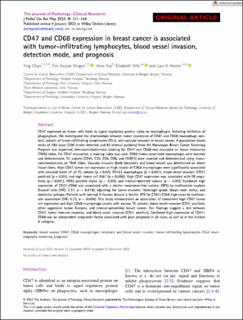| dc.description.abstract | CD47 expressed on tumor cells binds to signal regulatory protein alpha on macrophages, initiating inhibition of phagocytosis. We investigated the relationships between tumor expression of CD47 and CD68 macrophage content, subsets of tumor-infiltrating lymphocytes (TILs), and vascular invasion in breast cancer. A population-based series of 282 cases (200 screen detected and 82 interval patients) from the Norwegian Breast Cancer Screening Program was examined. Immunohistochemical staining for CD47 and CD68 was evaluated on tissue microarray (TMA) slides. For CD47 evaluation, a staining index was used. CD68 tumor-associated macrophages were counted and dichotomized. TIL subsets (CD45, CD3, CD4, CD8, and FOXP3) were counted and dichotomized using immunohistochemistry on TMA slides. Vascular invasion (both lymphatic and blood vessel) was determined on whole tissue slides. High CD47 tumor cell expression or high counts of CD68 macrophages were significantly associated with elevated levels of all TIL subsets (p < 0.02), CD163 macrophages (p < 0.001), blood vessel invasion (CD31 positive) (p < 0.01), and high tumor cell Ki67 (p < 0.004). High CD47 expression was associated with ER negativity (p < 0.001), HER2 positive status (p = 0.03), and interval-detected tumors (p = 0.03). Combined high expression of CD47–CD68 was associated with a shorter recurrence-free survival (RFS) by multivariate analysis (hazard ratio [HR]: 2.37, p = 0.018), adjusting for tumor diameter, histologic grade, lymph node status, and molecular subtype. Patients with luminal A tumors showed a shorter RFS for CD47–CD68 high cases by multivariate assessment (HR: 5.73, p = 0.004). This study demonstrates an association of concurrent high CD47 tumor cell expression and high CD68 macrophage counts with various TIL subsets, blood vessel invasion (CD31 positive), other aggressive tumor features, and interval-presenting breast cancer. Our findings suggest a link between CD47, tumor immune response, and blood vessel invasion (CD31 positive). Combined high expression of CD47–CD68 was an independent prognostic factor associated with poor prognosis in all cases, as well as in the luminal A category. | en_US |

